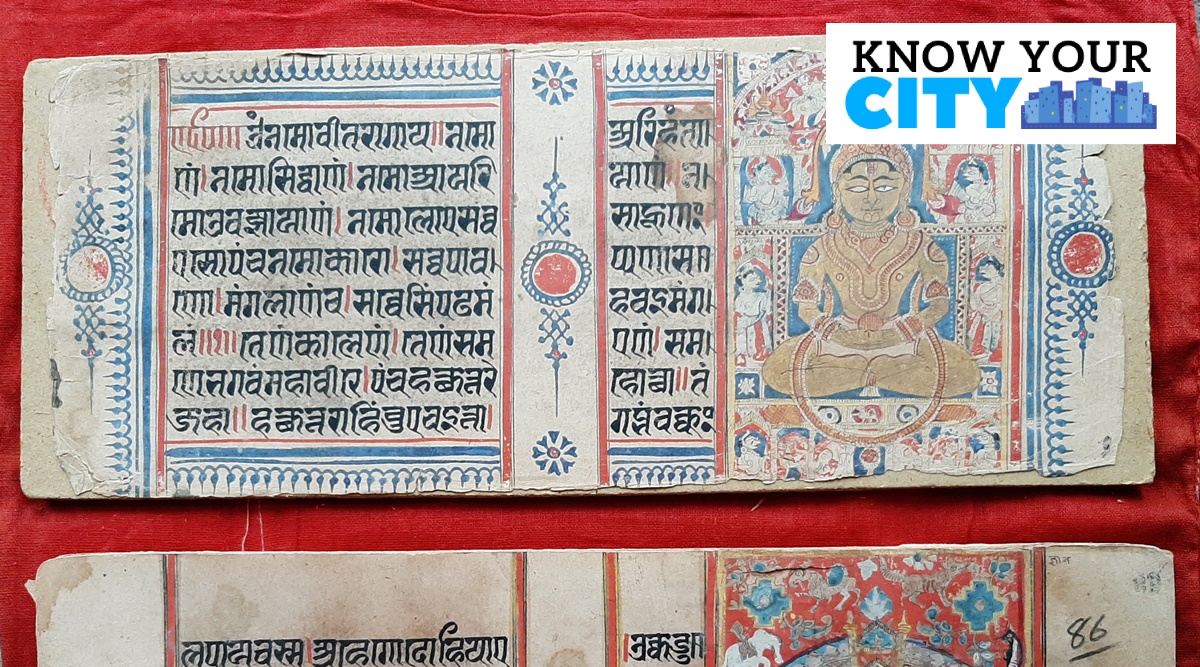 Over 5,000 Jain manuscripts are safety deposited in the various chambers of the Bhandarkar Oriental Research Institute in Pune.
Over 5,000 Jain manuscripts are safety deposited in the various chambers of the Bhandarkar Oriental Research Institute in Pune.In the heart of Pune city, inside the quaint campus of Bhandarkar Oriental Research Institute (BORI), lie thousands of ancient manuscripts that are crucial to an ongoing worldwide project recording the living history of Jainism.
Painstakingly collected by the early students of Indology, the collection of more than 5,000 Jain manuscripts is an important link in the ongoing Jaina Prosopography project undertaken by the School of Oriental and African Studies (SOAS) of the University of London.
Dr Amruta Natu, assistant curator, BORI, and supervisor of the project, says the story of how the manuscripts found their way to BORI is an interesting one. Back in 1866, the then British government set up a special task force to collect and catalogue manuscripts from each of its provinces. In the then Bombay province, which also included Gujarat, scholars like Jorge Buhler, Peter Peterson, R G Bhandarkar and others travelled the length and breadth of the presidency, to collect manuscripts for preservation.
It was not an easy task, says Dr Natu, pointing to various memoirs that reveal how scholars were refused entry at many places. “They had to return repeatedly to convince people that the manuscripts would not be taken away from the country. In fact, it was only after the then government made an announcement in the public domain that the manuscripts were donated for the cause,” she said.
Best of Express Premium
Buhler, in his zeal, not only travelled to nooks and corners of Bombay Presidency but also travelled to many princely states in Rajasthan. It was during one such trip that a hitherto unknown major work of poetry was discovered in Bhandara in Jaisalmer. “Buhler and his companions copied this work in six days and later it was proved that many of the references in the poem were historically accurate,” said Dr Natu. “He had travelled to Kashmir in 1875 to collect manuscripts from there.”
The Jain manuscripts are part of the over 17,000 manuscripts that were collected and initially housed at Elphinstone College in Mumbai. When the city’s humid air was deemed detrimental for the manuscripts, they were moved to Deccan College, Pune, in 1875-77. Once BORI was established, this precious collection was moved there for preservation and studies.
An ancient religion that stresses on non-violence as one of its cardinal principles, Jainism was once mistaken as an offshoot of Buddhism by early Indologists. It was the seminal works of Hermann Jecobi and Buhler that proved to the world that Lord Mahavir’s Jainism was a distinct religion with an ancient and rigorous system of beliefs and philosophy.
 A closer look at Jivajivabhigamasutra
A closer look at Jivajivabhigamasutra The Jain manuscripts, Dr Natu explained, were stored mainly in what is called ‘Jnana Bhandaras’ or knowledge stores. These were presided over by officials who acted as curators. These ‘bhandaras’ were treasure troves for historians. Especially important for students of history were its colophons, statements at the end of a book that gives information on the author, where the manuscript was composed, the lineage of the monk or the royal patron, the end date of the project etc.
One of the oldest manuscripts in BORI’s collection dates back to 906 CE and is titled ‘Upamitbhavaprapancha Katha’ or an anthology. Most of the manuscripts deal with the Agamas, Jain canonical works, along with their commentaries. Manuscripts of both Prakrit and Sanskrit exist in the collection. Many of the manuscripts are exquisitely decorated with miniature art. The collection has its own share of palm leaf manuscripts as well as those written on handmade paper.
It is this collection that is now an important part of the University of London’s ongoing Jaina Prosopography project. The genesis of this work, which aims to collect more information about Jain mendicants, texts and patrons, lies in the ground-breaking work of Johanness Klatt, an assistant librarian in the University of Berlin. While cataloguing the library’s Jain collection, Klatt started collecting data about individuals and lineages mentioned in the manuscripts. His work gathered dust for centuries before it was published by Professor Peter Flugel.
 The two folios of Jivajivabhigamasutra
The two folios of Jivajivabhigamasutra The need was felt for more systematic studies into the manuscripts and thus the project of Jaina Prosopography was conceived. The project aims to trace historical data about a set of individuals using references from the manuscripts – from monks and nuns to royal patrons and lay devotees.
Dr Natu’s team in BORI are mining the vast collection of manuscripts for the project while another team of five scholars is cataloguing the inscriptions on icons and images in Gujarat. Till date, the team has collected information about 90,000 personalities and come across many interesting snippets, like names of sects that no longer exist.
Using tools and cross disciplinary studies, the project aims to get information about the mendicants, their lineages, their royal patrons, as well as the movement of the monastics – an ambitious project that BORI is a proud part of.
- The Indian Express website has been rated GREEN for its credibility and trustworthiness by Newsguard, a global service that rates news sources for their journalistic standards.

